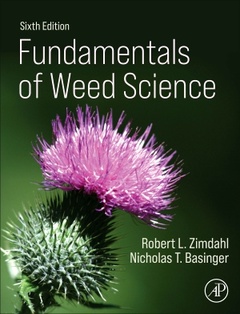Description
Fundamentals of Weed Science (6th Ed.)
Language: English
Subjects for Fundamentals of Weed Science:
Keywords
<; P>; herbicides; plants; control; management; genetic modification; the environment; resistance<; /P>
576 p. · 21.5x27.6 cm · Hardback
Description
/li>Contents
/li>Biography
/li>Comment
/li>
Fundamentals of Weed Science, Sixth Edition, places weed management in the context of weed research and science, presenting the latest advances in the role, control, and potential uses of weed plants. This book uses an ecological framework to explore the role of responsible and effective weed control in agriculture from the emergence and genetic foundation of weeds to the latest means of control and environmental effects. Fully revised, updated, and expanded, Fundamentals of Weed Science now includes insights into international trad eand consumer preferences, weed seedbanks, advancements in robotic weeding, weed flaming, and the potential of precision agriculture in weed science.
1. Introduction 2. Weeds – The Beginning 3. Weed classification 4. Ethnobotany 5. Weed Reproduction and Dispersal 6. Weed Ecology 7. Weed population genetics 8. Invasive Plants 9. Allelopathy 10. Methods of weed management 11. Weed management in organic farming systems 12. Biological Weed Control 13. Chemical weed control 14. Herbicides and Plants 15. Herbicides and Soil 16. Properties and use of herbicides 17. Herbicide Formulation 18. The role and future of genetic modification 19. The Problem and Study of Herbicide Resistance 20. Herbicides and the environment 21. Pesticide legislation and registration 22. Weed Management Systems 23. Weed Science – The Future
Dr. Basinger is an assistant professor of Weed Science at the University of Georgia in the Department of Crop and Soil Science. He received both his Masters and PhD from North Carolina State University in Weed Science. Dr. Basinger’s research focus is on the alteration and manipulation of the agroecosystem to reduce the impacts of weeds. He also is devoted to Integrated Weed Management (IWM) as a means to manage weeds, minimize potential for herbicide resistance, and improve productivity of desirable crops in crop and non-crop systems. Dr. Basinger is responsible for teaching several weed science courses at the University of Georgia. He is an active member of the Southern Weed Science Society and the Weed Science Society of America, is a board member on the Southern Cover Crops Council, and a member of the Getting Rid of Weeds (GROW) Initiative.
This author team implements legacy planning for this proven title. It demonstrates the targeted balance between experienced expert and early-career professional who can continue the title into new editions.
science research
• Covers all traditional aspects of weed science as well as current research
• Provides broad coverage, including relevant related subjects like weed ecology and weed population genetics
These books may interest you

Recent Advances in Weed Management 116.04 €

Recent Advances in Weed Management 158.24 €

Radioisotopes in Weed Research 208.65 €

